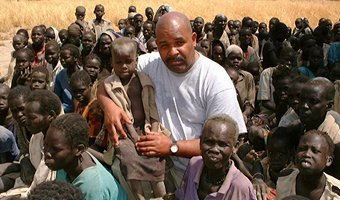Relationship is the heart of mission involvement, and the form that relationship takes determines whether believers minister “with” or “to” others, missiologists insist. Today, they add, relationship translates as partnership, collaboration and reciprocity.

Radio talk show host Joe Madison, seen here in a 2001 visit to Sudan, has helped raise the visibility of the Sudan crisis among black churches in the United States.
|
“I definitely see more cooperation, partnership and collaboration,” explained Michael Stroope, associate professor of Christian missions at Baylor University’s Truett Theological Seminary. “A number of people describe it … as a two-way street with benefit going in two directions.”
Sending mentality
Developing a more cooperative spirit requires first letting go of past patterns. “I think that in the past, we had a confessional approach. … Those who agreed with us were welcome to go with us,” said Keith Parks, president of the Southern Baptist Convention’s Foreign Mission Board from 1980 to 1992 and later the coordinator of global missions for the Cooperative Baptist Fellowship.
Credited for leading the mission board to work with unreached people groups in Asia and Africa, Parks acknowledged, “We were … strong on starting Baptist churches, but we didn’t expect those we worked with to always agree with us.”
Then in 2001, Southern Baptists shifted to a creedal approach, Parks said. “That changed the nature of missions. Missionaries would go in, and if nationals didn’t agree, the missionaries would not work with them.”
American Christians’ understanding of their own culture plays into their approach to missions. “Many of us think of ourselves as coming out of the sending mentality … the sending west,” noted Rob Nash, coordinator of CBF global missions. “We think we are enlightened and have moved beyond the sending mentality, but the reality is that we need to see ourselves in the mirror.”
Culturally, Americans see themselves as objective observers, Nash believes. “But we need a confession of who we are, and we need to get in touch with the culture,” he said. “We are future-oriented, pragmatic, linear and action-oriented. We don’t realize how these things affect our relationship with others. If we are not in touch with who we are, we tend to devalue the opposite.”
Paternalism & dependency
The sending concept can lead to a paternalistic approach to missions—doing for people and taking the gospel to them, rather than participating in ministry with them. While more Christians have adopted a reciprocal approach to missions, paternalism hasn’t completely been overcome, Nash believes.
“Paternalism is difficult to recognize. Often, we can’t see it when we’re doing it. This is where I think those of us who work with missions have to really become listeners much more than people who fill up the air with words,” he said. “We live in a day when we need to be taught. … There are others at the table doing missions in far better ways than we are right now.”
Churches and missionaries can fall prey to financial paternalism in which the community being helped must rely on the congregation or sending agency for the money to continue ministry. Or groups can be doctrinally paternalistic when they insist on controlling beliefs, Parks said.
How does a congregation know when it’s worked too long with a particular community? That depends on the relationship between them, said Rick McClatchy, CBF coordinator in Texas. “The partnership has to be evaluated to make sure dependency isn’t developing, … but coming in for just a short time doesn’t build the trust and relationship necessary for ministry.
“Dependency is a legitimate thing, but you don’t want to go too far the other way because those long-term relationships … lead to trust and transformation. … You don’t want to drop relationship or not take the time to build relationships.”
Stroope believes as long as the relationship is built on collaboration and reciprocity, dependency becomes less of an issue, especially if each side is honest with the other. “It works when there are good partners on the ground who aren’t afraid to say no and who aren’t afraid to set the terms of participation,” he said.
“Sometimes the relationship is not open enough for limits to be set. Volunteers need to know that what they are doing is part of a strategy and that it is ongoing. That understanding must become part of why they are going and how they go.”
Reciprocal ministry
Chris Thompson, coordinator for Liberty, Mo.-based Together for Hope West, looks at all the entity’s endeavors through the lens of reciprocity and collaboration. Together for Hope West helps coordinate the national CBF Together for Hope Rural Poverty Initiative in areas west of the Mississippi River.
“Rather than using an historic model of bringing in mission teams to do for people, we develop relationships for sustained empowerment for locals,” he explained.
Together for Hope West relies on four “R’s” of community development and cross-cultural ministry—reciprocity, relationship, reconciliation and respect. Staff also make sure ministry is guided by a core-value model—local visioning, leadership, project development, long-term sustainability, local expertise in education and engagement, and an emphasis on the process rather than on the outcome.
The organization builds on relational ministry. “It’s the relationship that’s important—to listen and share the person’s story and to hear the voices silenced by circumstances … even when what we hear is hurtful,” he said. “We must be a part, be a presence in people’s lives. Sometimes that’s a challenge.”
